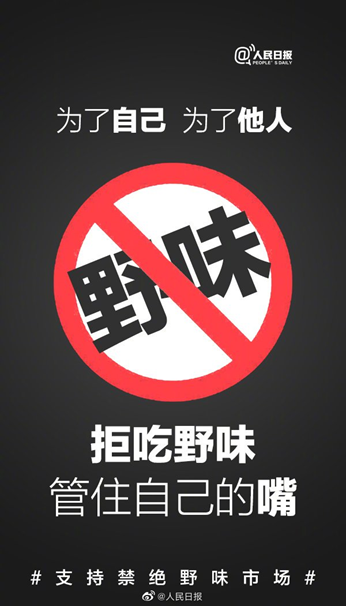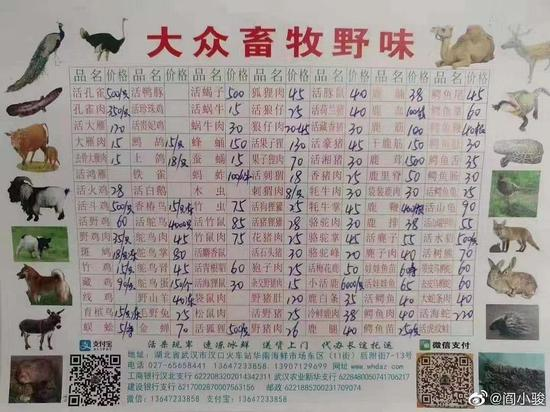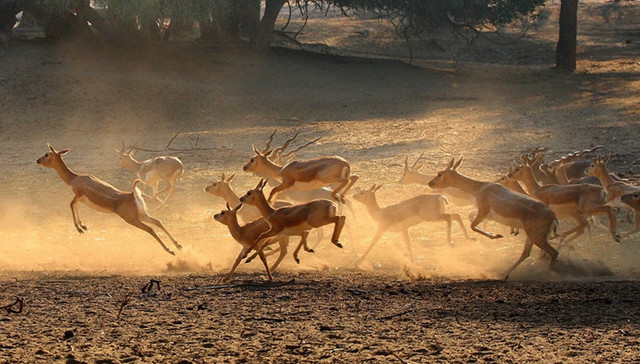The novel coronavirus pneumonia epidemic 2019-nCoV is still spreading, and it is imperative to combat illegal wildlife trade
The outbreak of the new coronavirus pneumonia in Wuhan has once again triggered discussions on illegal trade in wildlife. Experts suggest that the fight against illegal trade in wildlife should be raised to a public safety level and a management system be established.
At a press conference held by the Information Office of the State Council on the morning of January 22, 2020, Gao Fu, an academician of the Chinese Academy of Sciences and director of the Chinese Center for Disease Control and Prevention, said that the source of the new coronavirus found in Wuhan was wild animals sold in a seafood market in Wuhan.
"There is a wildlife trade in this market, so the source may be wildlife and its polluted environment. At first, it was only animal-to-human transmission, and then the virus made adaptive mutations to the host. There is definitely human-to-human transmission after mutual adaptation, and there has been some community transmission.” Gao Fu said.
Some news media noticed that when the confirmed case of 2019-nCoV just appeared, there was already a phenomenon of selling game in this seafood market in Wuhan. According to the China Business Daily, several residents near the seafood wholesale market have confirmed that some hidden merchants in the market have long been selling game, and a photo provided by one resident shows that marmots, snakes and other animals are in the iron cages of the merchants.
According to Article 27 of the "Wildlife Protection Law of the People's Republic of China", China explicitly prohibits the sale, purchase, and use of nationally protected wild animals and their products. At the same time, Article 32 prohibits online trading platforms, commodity trading markets and other trading venues from providing trading services for illegal sale, purchase, and use of wild animals and their products or prohibited hunting and hunting tools.
In response, Lv Zhi, a professor of conservation biology at Peking University and executive director of the Research Center for Nature Conservation and Social Development, publicly suggested that the State Forestry and Grassland Administration and local wildlife authorities and law enforcement agencies should take responsibility and take the initiative to make a difference. Take action to ban and severely crack down on illegal wildlife markets and trade, as well as the illegal operation of restaurants, and raise the fight against illegal wildlife trade and set management system to the level of public safety.
In an interview with the news media, Lv Zhi pointed out that "illegal" involves two problems-the sources of wild animals is illegal hunting, or there are no legal procedures when entering the market.
Regarding poaching, Li Genshan, the project director of China Biodiversity Conservation and Green Development Foundation (CBCGDF) China Conservation Area for Mongolian gazelle at Zhongwei (CCAfa), told the media that at present there are fewer illegal wildlife transactions in the formal market, and wild animals that come from poaching are transferred to underground trading.
On the other hand, China implements a permit system for the national key protected wild animals for artificial breeding, and artificial breeding requires a license for artificial breeding. However, the artificial breeding permit system is highly controversial.
"Almost all merchants holding this license will operate beyond the scope, and they will use this as a cover to do business in the illegal wildlife trade." The "Wilderness Conservation" team of the Beijing Grassland Alliance Environmental Protection Promotion Center published an article that stated at present, there is an interest chain for the use of illegal wildlife in China. Starting from wild capture (poaching), the catcher sells the animal to an intermediate acquirer, and the intermediate dealer sells it to a higher-level acquirer.
Such acquisitions often have multiple levels, and high-level acquirers often have wild animal domestication and breeding licenses issued by the forestry department. Illegal captures and acquisitions, which have been whitewashed as 'legal' products because of a domestication and breeding license, are delivered to various markets in a grand manner. "The above article points out.
"From an international perspective, many epidemics are related to wild animals, especially edible wild animals. Illegal trade in wild animals objectively brings two disadvantages, which both damage the ecosystem and bring hidden danger to human security. Lv Zhi believes that the epidemic is tantamount to a war, "This is caused by human beings."
Ma Zhijun, a professor at the School of Life Sciences at Fudan University and a director of the Chinese Zoological Society, pointed out in an interview that the present is an opportunity to combat illegal wildlife trade, “Regarding the legal breeding and breeding of wild animals, the standardization of management must be emphasized.”
On the afternoon of January 22, CBCGDF issued a public recommendation to the State Administration of Market Supervision. The CBCGDF recommends that China comprehensively and urgently clean up and rectify the permits for hunting, breeding, and operation of wild animals, comprehensively and urgently clear and rectify unlicensed and beyond-range operations and lend and affiliate wild animal artificial breeding certificates and operations. In addition, it also includes the cleanup and rectification of illegal wildlife trading and sale of hunting tools on the Internet, and severe crackdowns on illegal trade in wildlife and their products.
The "Wilderness Conservation" team directly suggested that no new wild animal domestication permits should be issued, and a new wildlife management system should be studied to change the guiding principle of utilization into a guiding principle of protection. From the perspective of protection, design management methods and administrative permits.
The media was informed that at present, Henan, Wuxi, Wuhan, Shanghai, Hefei and other places have strengthened the control of live poultry transactions. The urgent notice issued by the Henan Market Supervision Bureau on January 21 prohibiting the sale of live poultry stated that those who refused to suspend business shall be put on file for investigation and punishment according to law, and shall be transferred to public security organs according to law. The Hefei Municipal Government requires the seasonal closing of the live poultry trading market from January 25 to April 30. During the market break, all live poultry trading is banned in the urban area, live wildlife in the trading venues are emptied, and trading venues, facilities and equipment are cleaned and disinfected in accordance with health and epidemic prevention requirements.
On January 22, the official Weibo of the State Forestry and Grassland Administration announced that the State Administration of Market Supervision, the Ministry of Agriculture and Rural Affairs, and the State Forestry and Grassland Administration had issued an "Emergency on Strengthening Wildlife Market Supervision and Actively Doing a Good Job of Epidemic Prevention and Control". The Notice requires all localities to strictly enter the market for non-quarantine qualified wild animals; highlight key places such as farmer's markets, supermarkets, restaurants, etc., as well as websites, conduct joint inspections, strengthen the investigation of hidden dangers, and severely crack down on illegal and illegal transactions of wild animals. If yes, transfer it to the judicial organs in time.
Lv Zhi also suggested that China should strengthen public awareness of wildlife protection, explain the relationship between nature protection and public safety, and everyone, so that the bad habits of people eating wild animals will gradually change, and wildlife protection will become more popular and become mainstream action in society.
"It is necessary to appeal to everyone to control the greedy appetite, but the public's change of awareness takes time. Now must first manage from the market. From the perspective of the regulatory department, it is the minimum to take responsibility.” Lv Zhi said.


(Photo credit: People's Daily)

Exterior view of the closed Nanhua Seafood Wholesale Market in Wuhan (Photo credit: The Beijing News)

The price list of game circulated on the Internet (Photo source: Internet)

(Photo source: Internet)
Original Chinese article:
https://m.jiemian.com/article/3904752.html
By / Maggie
